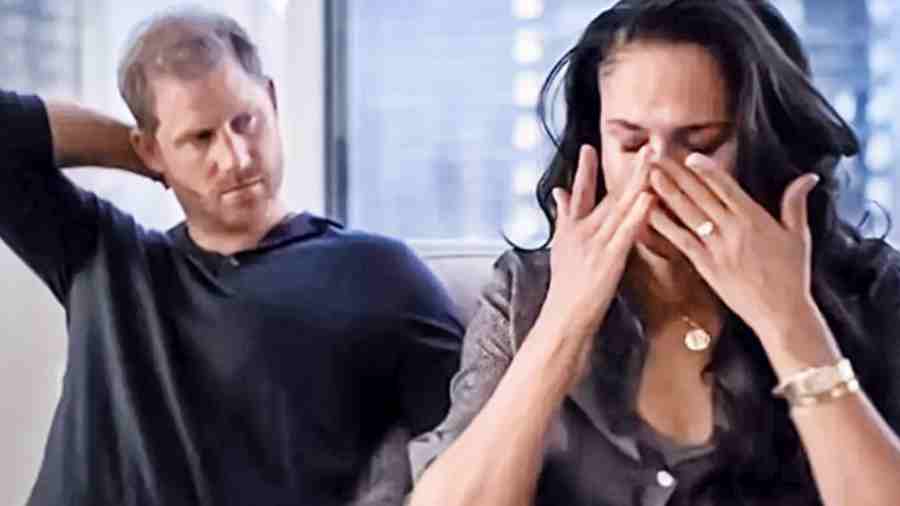Over the past two weeks, there has been much excitement in the British and the American press over the Harry and Meghan mini-series on Netflix. Mainstream news channels had bureau reports from their correspondents in Britain, all treating it as serious news; anchors on channels such as CBS and CNN interviewed other journalists on air about the revelations; and The Guardian ran a daily blog as the episodes were released. The media outlets listed key takeaways with each day’s release, as if a major news summit was in progress. This one is from CNN: “Royal rifts, death threats and media storms: 11 things we learned from Harry and Meghan’s final Netflix episodes”.
It is hard to tell who is living off whom. There are two villains in this six-part documentary series — the British media and the royal family. Both the tabloid press and the celebrity press called out by the couple have responded with wall-to-wall coverage after being accused of driving the Duchess to near-suicide and causing miscarriage of her second pregnancy. There were shades of Princess Diana, Harry’s mother, being driven to her death in a car crash by the chasing paparazzi.
Meanwhile, the palace on its part, has responded to the couple’s story of their plight with careful sympathy. How do you effectively counter six episodes of shrewdly crafted, real-life drama that point the finger at fellow royalty?
OTT platforms today are able to mount lavish productions that depend on television-watching audiences rather than theatre releases to recover their money. Possibly, this is the first time any celebrity has been able to turn the tables on their baiters quite so spectacularly, telling their side of the story at some length and employing an Oscar-nominated film director for the production.
What makes the series noteworthy is the genre that is being experimented with: a self-commissioned documentary with unnamed, off-camera interviewers and interviewees chosen from friends, relatives and sympathisers. There are no critics or neutral observers here. It is not their side of the story that is being narrated to a media outlet or to an Oprah Winfrey where the questions would not really be in their control. The prince and the duchess are among the executive producers of the series. It is an outing of their version as produced by them.
If the press was living off churning out clickbait news on this couple, Harry and Meghan on their part choose to focus on the role of the media and the social media as they tell their story with lots of never-seen-before footage. It serves up as an intimate love story even as it is carefully scripted to shaft other members of the royal family. After the fictionalised Crown series, here is a real-life soap served up as such. And it has, predictably, unleashed a storm of coverage from the media that are being partly blamed for their harassment.
The Guardian’s media editor, Jim Waterson, pointed out that newspapers which denounced the royal couple for making a Netflix documentary about themselves, one that was highly critical of the British media, were also providing extensive coverage about the contents of the same documentary. Within two hours of the release of the first episodes, there were 12 stories on Mail online and seven on The Sun. Articles about the couple drive an enormous number of clicks to news websites, he added.
Footage from the series is being spun into endless videos online. The Morning Show on 7News ran an episode on “Dealing with the tabloids — How Harry and Meghan handle the global press” which got in an expert on body language to analyse the couple’s body language. “When they are side by side what do you see? What do you notice when they are apart?”
Waterson has also written about how this royal couple is seeking to end the impunity with which newspapers and TV shows treated Britain’s royalty as celebrity fodder because so far, for decades, members of the royal family were advised to avoid confrontation with the press. And how Harry is fighting four different cases against many of the same newspapers that are leading the criticism of his documentary.
A strong suggestion of the palace planting stories in these newspapers to discredit Harry and Meghan runs through the episodes. We are shown how Meghan was a hit with the crowds on the couple’s Australia trip and how the tenor of domestic coverage changed after that. “The issue is when someone who’s marrying in, who should be a supporting act is then stealing the limelight or is doing the job better than the person who is born to do this. That upsets people. It shifts the balance,” says Harry. The more racist coverage in the media began after that with associations with drugs, criminality or terrorism being peddled about Meghan. Meghan’s mother recounts in an interview how her daughter told her she had thought about taking her own life after being constantly “picked at by these vultures” in the media.
There is also a reference to a hate campaign on social media, quoting a tweet which says “Meghan just needs to die”. “The seriousness of what has happened to her and what… happened to us, and what continues to happen to her, that needs to be acknowledged,” said Harry. Meghan says to an off-camera interviewer, “You are making people want to kill me… It’s not just a tabloid. It’s not just some story. You are making me scared. Right?”
Another video snippet from the series which was put out by CNN Entertainment has Prince Harry (variously referred to as ‘H’ and ‘Ginger’) blaming the media for causing mental stress to his wife which led to her miscarrying their second baby. The UK newspaper, The Mail on Sunday, had published a private letter to her father, Thomas Markle. Harry says, “I believe my wife suffered a miscarriage because of what the Mail did.” The couple subsequently sued The Mail. At that point, The Mail on Sunday had said that it would pay Meghan Markle just one pound as damages for publishing the letter.
The Leveson Inquiry into the practices and ethics of the British press following the News International phone hacking scandal began in 2011. Eleven years later, it seems that this beast remains incurable. The hounded couple have stepped down from royal duties and relocated to California where a fence is being constructed around their new home to keep out the paparazzi. But it remains an unequal battle.










